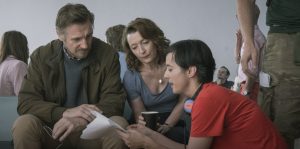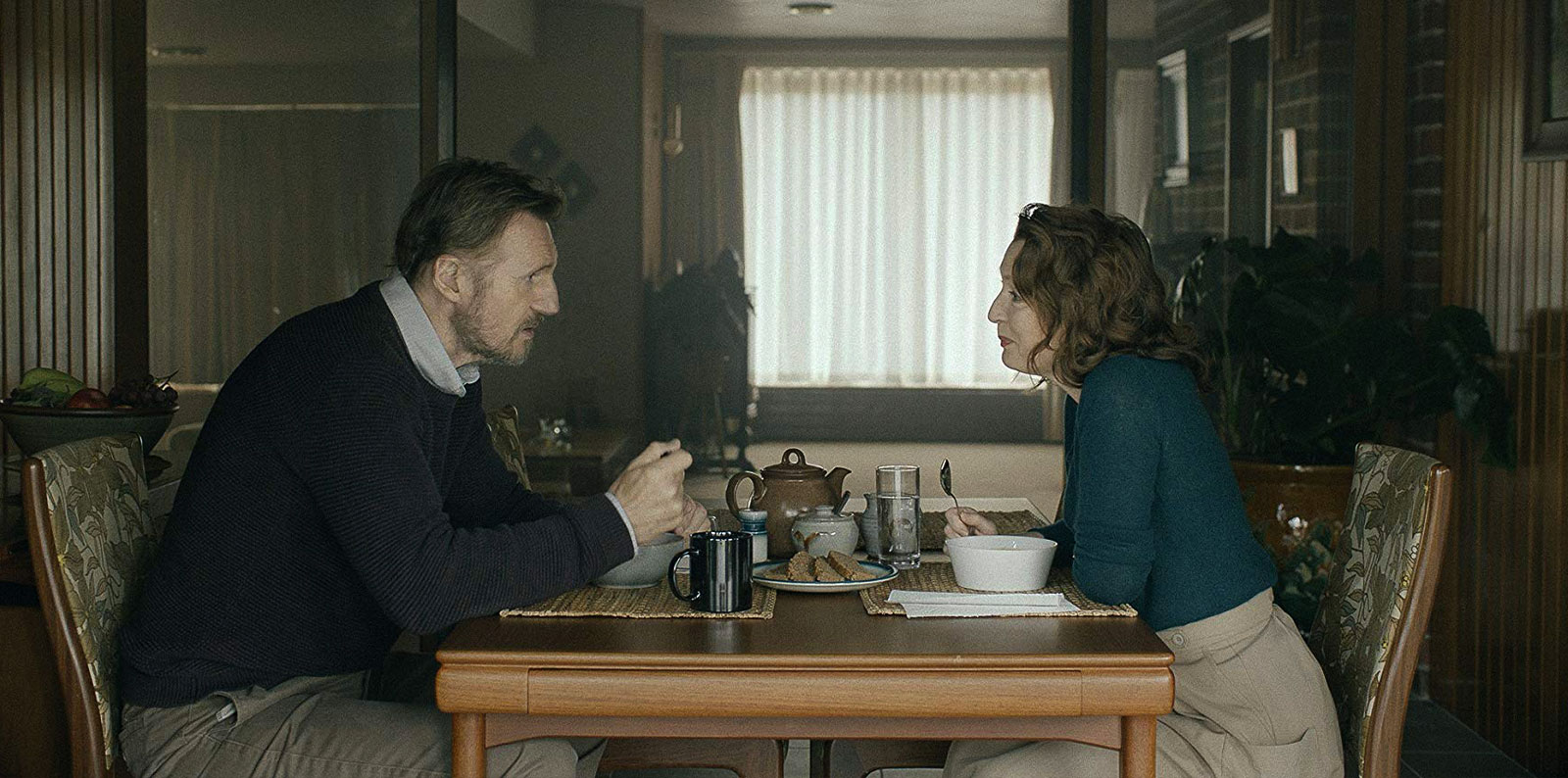
Ordinary Love is a special film in that it shows us the ins and outs of living with cancer, and also living with someone who is living with cancer. It’s not always pretty, but it doesn’t always equal the end of the road either. Liam Neeson and Lesley Manville play Tom and Joan, an ordinary couple in Northern Ireland who face the devastation of Joan’s breast cancer diagnosis. Based in part on screenwriter Owen McCafferty’s experience with his wife, Peggy and her cancer diagnosis, the film normalizes something that millions of people face every day and affirms that cancer doesn’t always mean a death sentence.
I was able to talk with directors Lisa Barros D’Sa and Glenn Leyburn, who are also husband and wife, about their newest film and here’s what they had to say:
This film is just so moving to me because my stepmother passed away from lung cancer a few years ago, and of course, Joan doesn’t die in the film, but I feel as though Tom’s experience kind of mirrors my dad’s. Secondly, you guys are married, so I’m curious if the two of you have faced any similar tragedies together that informed your ability to create this world?
Lisa Barros D’Sa: Thank you for sharing your story and I’m sorry about your loss. The story that this is based on is really in the life of Owen McCafferty, the screenwriter and about what happened when his wife was diagnosed with breast cancer. As a couple ourselves, we’ve certainly gone through family tragedy together but nothing exactly equivalent to this story. We always felt about this story that everybody has a journey with grief and loss, it’s just one of those things that humans, once we get to a certain age, can all relate to, so it always felt to us that it was everybody’s story. There are some specifics to the cancer journey that Joan goes through, but in a broader, more universal sense, we can all recognize what it’s like to face those themes. Also the power of that connection with somebody close that can keep us going through those times.

“…a film about this would do some good in the world and be helpful for people.”
Had Owen McCafferty already written the screenplay and presented it to the two of you, or how did you three get connected?
Glenn Leyburn: Owen’s a very well-known playwright in Ireland and the UK. He’s somebody that we had wanted to work with for quite some years. We had talked about different projects and nothing had really come to fruition. One of the other producers, David Holmes, who’s also a musician, he did the score for this film as well…David actually grew up with Owen and known him since he was a child. David knew about Owen’s journey with his wife Peggy. It was really David that said to Owen, he knew that Owen had drawn a lot from his personal experience for his writing and David had said: “Maybe that’s something you should look at.” He knew about that year’s journey. I think initially Owen was resistant but when he went to Peggy and he thought about it, he felt that this wasn’t really a cancer story, it was a love story. Also, talking with Peggy, I think between them they thought a film about this would do some good in the world and be helpful for people.
Barros D’Sa: It’s a positive story in the sense that maybe it can provide a bit of insight into this journey in a way that other storytelling around this subject doesn’t, perhaps. I think what we were really drawn to about it was this story about a marriage. It felt like a very fresh look at a marriage relationship and it’s a fresh kind of love story. It doesn’t focus on the beginning of a romance or the end of it but more of what happens in the depth of it, in the heart of a relationship. It’s something that we don’t tend to see quite so often. These are characters that are different but they’re equal. They create this kind of beautiful energy between them. It’s also about a middle-aged couple and they’re not bored with each other. There’s a great vibrancy to their relationship. They make each other laugh, they’re attracted to each other…and all of that felt really exciting and interesting. It’s not the type of relationship we often see on-screen.
Yeah, I definitely agree and I thought that was part of what made it unique. So there’s a lot of stuff going on in hospitals here, understandably, due to the subject matter. As you were shooting, did you talk to anyone who had gone through similar circumstances? Also, what kind of research did you two do in preparation?
Barros D’Sa: Not just because it came from a personal story, and in respect of the journies that people really go through in life, we spoke to Owen’s wife, Peggy. She was very generous in sharing the details of her journey. We also connected with the consultants at the cancer center where she was treated. We spoke to Dan Sloan and Jan Horowitz, both consultants that deal with cancer patients every day and they were very helpful through the script stage to coming on set and advising. I come from a medical family, I’ve got lots of doctors in the family. For that reason, it was important to get things right and tell the story as well as we could and as truthfully as we could. So, to that end, we also had a lot of medical professionals that not only helped with the script, etcetera but who were also on set. They helped our art department and also actually appear in the film. When Leslie is going through her first round of tests, her mammographer is a real mammographer. There’s a real radiologist taking her through those tests. There are real chemo nurses. All these professionals who work extremely hard gave of their valuable free holiday time to come in and work with us. So all of the people in the film playing these roles are real medical professionals.
“…it was important to get things right and tell the story as well as we could and as truthfully as we could.”
What it was like working with the two leads because they’re so great. I love both Liam Neeson and Lesley Manville and I thought their chemistry was excellent but how was it working with them?
Leyburn: Yeah, it was absolutely amazing working with them. Liam is someone we had been talking to for quite some time and we were going to work on a project with him going back a couple of years. For one reason or another, that project hasn’t come to fruition but when we first read a draft of this, the script wasn’t written for Liam, but when we read the first draft, we heard Liam’s voice in it. Having met him and gotten to know him a little bit we thought this was something the three of us might connect with. We sent him the first draft, which is rare, I think, and he really connected with the first draft and pretty much signed up there and then. That was kind of amazing and incredibly special. Lesley is an actor that we have admired forever and we knew Liam was a fan as well, so that already was a piece that fit together. They had never met each other before or worked together but they had lots of mutual friends and when they finally got together it was almost immediately apparent that they had this wonderful chemistry. They shared humor, they shared a similar way of working…
Barros D’Sa: So yes, on set we like to have a very good outlook. We like a positive atmosphere where everyone can feel free to collaborate and give of their creativity as best they can. Liam and Lesley both have similar styles of working. They both like to relax, have a laugh and a joke between set-ups so the whole process of them being together on set every day was very joyful. For them to come together as a team. It was a lovely film for us as directors in that we were spending so much time with these two leads and so much of the journey on set was really focusing on them and getting in-depth with that relationship. Everyone got to know each other very well and there was a really nice trust established and a very easy way of working together. I think they really appreciated how great the crew was as well. We had a fantastic crew. Everything ran very well and it made them feel as though they were supported and able to do their best work.
I think an actor’s dream come true is to feel supported and through seeing them I can assume the two of you did a great job of doing so. I’m curious, what do you two hope that people get out of their Ordinary Love viewing experience? What sort of feeling do you want people to take away from it?
Leyburn: I suppose we want them to be heartened by what human connection can do and as we touched on, that we all go through tough times but it’s really love and human connection that carries us through those times and hope that resonated with the audience.
Barros D’Sa: Yes, I think that ultimately this always felt like–these characters go through tough times but it also felt like a really uplifting story about the potential in that kind of relationship. Hope can help keep each other afloat even in the toughest times.
Yes, absolutely. There’s something to be said about your work together. Each project is quite different from the next but do you two think there is a common thread that holds them all together?
Barros D’Sa: Yes, it’s interesting because we don’t like to be confined to one genre or another. We like the excitement of shifting pace, of shifting worlds. We look for great writing. We do feel that there is a common thread. For example, if you look at Good Vibrations, which is our last film about the punk music scene in Northern Ireland in the ’70s. The subject matter couldn’t be more different but I think it shares the idea, the willingness to face up to tough subject matter. As human beings, we do have to face up to these darker aspects of life, but I think we feel the intrinsic knowledge and also the warmth, the humor, the strength, the strategies that we can bring to those aspects and hope that we as human beings are able to find love and connection even while living through those dark times. So it’s humanity that we really enjoy from project to project.
“…we as human beings are able to find love and connection even while living through those dark times.”
As filmmakers, I have to imagine the dream is to capture so many different aspects of humanity. I just have one more question and this is something I try to ask everyone just out of curiosity. If you can name them, for both of you, which film or films influenced you in your youth to want to become filmmakers?
Barros D’Sa: Okay, for me, it might be a slightly odd choice because it’s a film—I’ve loved a lot of films but this is the one that kind of excited me about the medium–It’s a short film by Chris Marker and it’s called La Jetee
Oh my God, yeah, I love that movie!
Barros D’Sa: It’s told almost entirely in stills, there are no real moving images apart from one, but there’s something about the way it uses images to talk about memory and the past and the future and to throw all those things together using one storyline. It’s just one image after the next. There’s something about the possibility and the poetry within that that really excited me.
Glenn Leyburn: Influence-wise I think there’s a list of filmmakers that inspired me to make films. Directors like Sidney Lumet, who I love and that wonderful period in ’70s cinema. Fellini of course and Godard, Bergman, I could go on, there’s a list. In a way, I think there’s a lifetime of influences and not all of those are films. You know books or people I’ve met, it’s all those things you really kind of absorb and you hope that you’re able to distill that. All of that’s inspiring, not just film.
Yes, because art imitates life as they say. Thank you both so much for your time and congratulations on a great film!

